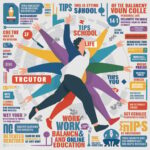
In today’s digital age, technology has revolutionized education, particularly for online students. From improving collaboration to enhancing organization, a plethora of tools exists to support and streamline the learning experience. Whether you’re enrolled in fully online courses or blending virtual classes with in-person sessions, leveraging these tools can significantly boost your academic success. Here’s a comprehensive guide to essential technology tools for online students:
1. Learning Management Systems (LMS):
Learning Management Systems like Moodle, Canvas, or Blackboard are central hubs for online education. They provide access to course materials, assignments, discussion forums, and communication with instructors. Familiarize yourself with your institution’s LMS to stay organized and engaged with your coursework.
2. Video Conferencing Platforms:
Platforms such as Zoom, Microsoft Teams, or Google Meet facilitate virtual classrooms, live lectures, and group discussions. These tools offer features like screen sharing, chat, and breakout rooms, enabling seamless interaction between students and instructors regardless of physical location.
3. Collaboration and Communication Tools:
Tools like Slack, Microsoft Teams, or Discord enhance communication and collaboration among peers and project groups. They allow for real-time messaging, file sharing, and task management, promoting teamwork and productivity in virtual settings.
4. Note-Taking Apps:
Apps such as Evernote, OneNote, or Notion are invaluable for organizing lecture notes, research findings, and study materials. These apps often sync across devices, allowing you to access and update your notes seamlessly whether you’re using a computer, tablet, or smartphone.

5. Online Libraries and Research Databases:
Access to digital libraries and research databases (e.g., JSTOR, Google Scholar, or your institution’s library resources) is essential for conducting thorough research and accessing academic journals and publications. Make use of citation management tools like Zotero or Mendeley to organize references and streamline the citation process.
6. Time Management and Productivity Tools:
Tools like Trello, Todoist, or Asana help you manage tasks, set deadlines, and track progress on assignments and projects. These tools employ task lists, calendars, and reminders to keep you focused and organized amidst multiple deadlines and responsibilities.
7. Virtual Whiteboards and Mind-Mapping Tools:
Tools like Miro, Microsoft Whiteboard, or MindMeister facilitate brainstorming, collaborative note-taking, and visual organization of ideas. They are ideal for group projects, concept mapping, and creative problem-solving exercises.
8. Language and Skill Development Platforms:
Platforms such as Duolingo, Coursera, or LinkedIn Learning offer courses and tutorials to enhance language proficiency, technical skills, and professional development. These resources complement your academic studies and help you acquire new competencies relevant to your career goals.
9. Cloud Storage and Backup Solutions:
Cloud storage services like Google Drive, Dropbox, or OneDrive provide secure storage and easy access to your documents, presentations, and assignments from any device with an internet connection. Ensure regular backups to safeguard your work against potential data loss.
10. Virtual Reality (VR) and Augmented Reality (AR) Tools:
Emerging technologies like VR and AR are increasingly integrated into online education, offering immersive learning experiences in subjects like science, engineering, and architecture. Explore educational apps and platforms that utilize VR/AR to deepen your understanding through interactive simulations and virtual tours.
Incorporating these technology tools into your online learning toolkit can enhance your efficiency, collaboration, and overall learning experience. Stay proactive in exploring new tools and adapting to technological advancements that align with your academic goals and learning preferences. By harnessing the power of technology, you can optimize your online education journey and achieve academic excellence with confidence.


